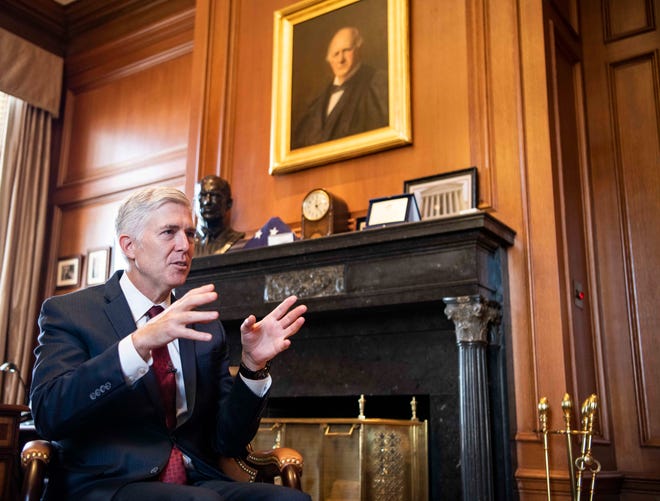
WASHINGTON – The Supreme Court agreed Friday to wade back into a dispute over who has jurisdiction over crimes that occur on Native American lands, following up on a 2020 decision that treats the eastern half of Oklahoma as tribal territory.
At issue is whether state courts in Oklahoma may hear cases involving non-Natives accused of crimes against Native Americans on reservations or whether those crimes should be handled exclusively by federal courts. The answer to that question will affect thousands of criminal cases in Oklahoma, state officials have said.
The case will be set for argument in April.
A 2020 Supreme Court decision upended the status quo in Oklahoma when a 5-4 majority ruled that Congress never disestablished the Muscogee (Creek) Nation's reservation, an area that encompasses 3 million acres and hundreds of thousands of non-Natives. State officials say that has had a "calamitous" effect on prosecutions.
Federal law assigns jurisdiction to different courts depending on whether the crime occurred on a reservation and whether the perpetrator or the victim is Native American. The upshot of the 2020 Supreme Court ruling is that federal and tribal courts have been flooded with criminal matters that were previously handled by state courts.
More:Native Americans are winning at the Supreme Court with help from Gorsuch
More:Supreme Court may decide soon whether to reconsider McGirt
State authorities charged Victor Manuel Castro-Huerta with neglecting his 5-year-old stepdaughter, a member of the Eastern Band of Cherokee Indian. But the Oklahoma Court of Criminal Appeals threw out the conviction, holding that because the crime occurred on Native American territory state courts didn’t have jurisdiction.
In its 2020 decision in McGirt v. Oklahoma, the Supreme Court ruled that millions of acres of Oklahoma remained Native American territory. Other courts extended that holding to other tribes, covering most of the eastern half of the state.

"No recent decision of this court has had a more immediate and destabilizing effect on life in an American state," Oklahoma's attorney told the Supreme Court in September. "Numerous crimes are going uninvestigated and unprosecuted, endangering public safety. Federal district courts in Oklahoma are completely overwhelmed."
Oklahoma officials have been fighting the McGirt decision with a series of appeals to the Supreme Court. Most of those cases ask the justices to overturn McGirt. But in announcing its decision Friday to take the case, the Supreme Court limited its review to the question of crimes committed against Native Americans by non-Natives.
The court specifically did not grant review on whether to overturn McGirt.
Others say Oklahoma is overstating the impact, which is limited to certain types of crimes and depends on whether the suspect or victim is a tribal citizen.
"There's an enormous amount of hype," Lindsay Robertson, an expert on Native American law at the University of Oklahoma told USA TODAY last year. "There's a narrative being spread by certain forces in the state about all the chaos."
McGirt was the result of an unusual majority on the high court: Associate Justice Neil Gorsuch, nominated by President Donald Trump, joined the four liberal jurists at the time. Gorsuch, a former judge on the Denver-based U.S. Court of Appeals for the 10th Circuit, has demonstrated a streak of independence when it comes to tribal law.
But since the 2020 decision, one member of that majority – Associate Justice Ruth Bader Ginsburg – died. She was succeeded by Associate Justice Amy Coney Barrett, also a Trump nominee, whose jurisprudence on tribal law is far less clear.
The Supreme Court could limit the scope of the McGirt decision without overturning it by deciding that state courts have simultaneous jurisdiction when a non-Native is accused of a crime against a tribal citizen. But Castro-Huerta’s lawyers say that’s a decision that should be left to Congress, not federal courts.
"Inter-sovereign negotiations always take time. Legislation does too," they argued in November. “When that process does not immediately yield one side’s desired outcome, it often blames the other. This court does not respond by taking up the legislative pen."
Source link








